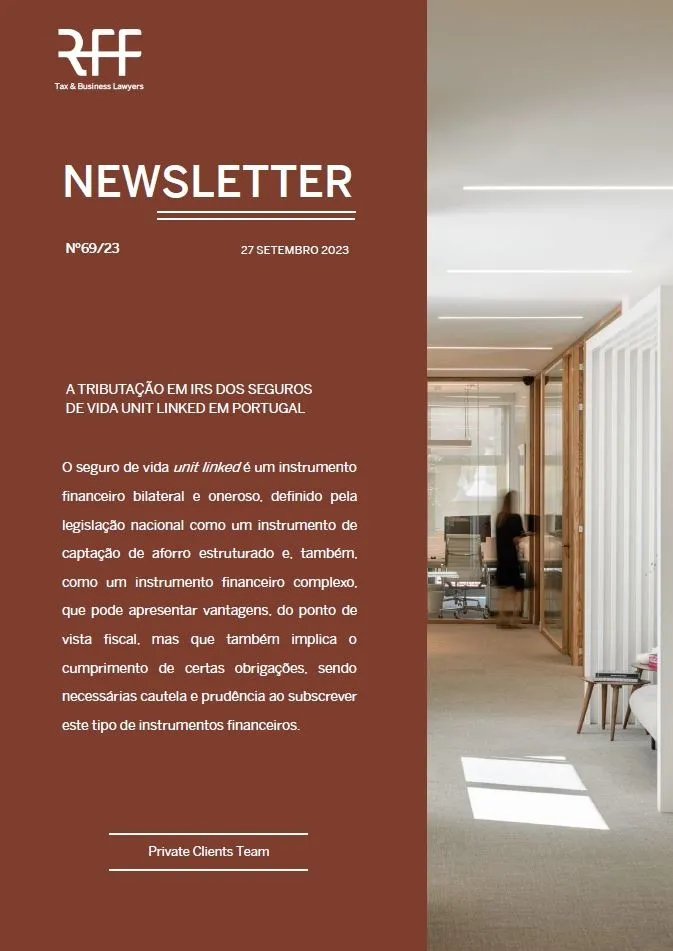Taxation of Unit Linked life insurance policies under personal income tax in Portugal

Taxation of Unit Linked life insurance policies under personal income tax in Portugal
SUMMARY
An unit linked life insurance is a bilateral and onerous financial in-strument, defined by Portuguese legislation as a structured savings instrument and also as a complex financial instrument, which can present advantages from a fiscal point of view, but that also implies the fulfilment of certain obligations, thus caution and prudence should be taken when subscribing this type of financial instrument.
INTRODUCTION
An unit linked life insurance is a bilateral and onerous financial instrument, defined by Portuguese legislation as a structured savings instrument and also as a complex financial instrument, which can present advantages from a fiscal point of view, but that also implies the fulfilment of certain obligations, thus caution and prudence should be taken when subscribing this type of financial instrument.
The holder of such insurance policy should receive a right or set of rights from the counterparty (i.e., the insurer or the insurance company) who guarantees, under the specific conditions of the contract concluded, the right to a fixed or variable amount of income, in according to the investment made, to the holder or any other beneficiary(ies) designated by him.
Nevertheless, it is important to note that the subscription of such instruments entails certain risks, which must be considered a priori by the holder.
In any case, the risk associated with this investment depends, always and entirely, on the insurer’s situation, the type of insurance and the conditions agreed by the parties.
As with any other type of investment, the risks associated with unit linked insurance policies depend on the entity in which funds are invested, thus it is advisable to examine the entity’s management prior to the completion of the investment.
THE APPLICABLE RULES TO RESIDENTS AND NON-RESIDENTS
According to the general rules set out in the Portuguese personal income tax Code, taxpayers considered as tax residents in Portugal are taxed on their worldwide income. On the contrary, those who are considered as non-residents will only have an obligation to report and pay the PIT on income from Portuguese sources.
Thus, if a Portuguese tax resident decides to subscribe a unit linked insurance policy, he will have to comply with the reporting obligations to the Portuguese Tax Authorities and may have to pay tax on that income, regardless of its country of origin. However, for non-residents, the obligation to report (and pay) will only occur if the insurance entity is Portuguese.
In any case, and as already mentioned, the subscription of this type of insurance implies the verification of several moments with potential tax relevance (in other words, events which generate taxable income), therefore, it is important to distinguish each event and clarify how each one may be taxed.
THE INSURANCE SUBSCRIPTION AND THE TRANSFER OF ASSETS TO THE INSURANCE COMPANY
Upon subscription, the holder can choose to make the capital contribution in cash or in-kind (i.e., transferring assets that he already holds).
It should be noted that, in this case, the insurer will not behave as a mere holder of the assets, rather as an investor since under the policy, the transferred in-kind assets become the insurer’s property. Hence, this in-kind contribution implies the transfer of ownership of those assets.
Indeed, in such cases, there will be a transfer of assets from the holder's legal sphere to the insurer's legal sphere, which may correspond to an onerous transfer of assets that may generate a taxable capital gain within the scope of category G of Portuguese Personal Income Tax, which calculation will depend on several factors.
As a general rule, the eventual capital gain generated by this subscription will correspond to the difference between the transfer value (entry/registration value in the insurer's sphere) and the original acquisition value by the holder of each of the assets. This difference will be subject to personal income tax at a 28% tax rate (or at marginal rates if the taxpayer opts for this option).
Finally, regarding the moment of its subscription, it should be noted that under the existing information exchange regimes, particularly the Common Reporting Standard, the subscription of a unit linked insurance in a European Union jurisdiction will be automatically communicated to the Portuguese Tax Authorities.
TAXATION ON REDEMPTION, ADVANCE PAYMENT AND INSURANCE MATURITY
As the money or assets are transferred in order to generate income, they will continue, as a general rule, to be capitalized. In fact, in most cases, the amounts generated are not immediately distributed to the insurance holder or the appointed beneficiaries, and as long as there is no effective distribution of income, no taxation will arise under Portuguese personal income tax.
Notwithstanding, in certain cases, the holder may opt for the redemption, advance and/or early maturity of the insurance, to be considered as an investment income (under personal income tax’s category E) upon the positive difference between the amounts paid on redemption, advance payment and/or early maturity of insurance policies, “Life” operations (which is the specific case of unit-linked life insurances) and the respective premiums paid, or amounts invested.
However, whenever the amount of premiums, sums or contributions paid during the first half of the term of the contract represents at least 35%, the following amounts are exempt from taxation:
- 1/5 (i.e. 20%) of the income if the redemption, advance or other forms of anticipation or maturity occurs a-ter 5 and before 8 years of the term of the contract; or
- 3/5 (i.e. 60%) of the income if this happens after the first 8 years of the contract.
In short, if the life insurance is subscribed from a Portuguese company, the income earned by a tax resident in Portugal will be subject to personal income tax at a rate of 28%, 22.4% or 11.2% (depending on the number of years passed on the date of the redemption, advance and/or early maturity of the insurance).
In the event that the insurance is subscribed with a foreign insurance company, the income distributed to a Portuguese tax resident will be subject to the same rules and tax rates.
On the other hand, in case the taxpayer has the special tax status of Non-Habitual Resident (“NHR”), a tax exemption may be applicable if the relevant Double Tax Treaty and the qualification of such income by the same Convention allows it, jointly considering the specific rules of the NHR regime. If that is not the case, taxpayers subject to the reporting obligation in Portugal receiving this type of income will be subject to the mentioned general rule, as explained.
Lastly, it should be noted that in the event of the death of the insured person, the payment of the compensation provided under the insurance will be excluded from taxation under PIT within the sphere of the beneficiaries. Thus, the liquidation of the insurance caused by the holder's death does not entail any taxation of the distributed income.
Nevertheless, and as previously stated, if the liquidation takes place at a time prior to the death and for a different reason, the distributed income may be subject to either a tax rate of 28% (with the aforementioned reductions, which may reduce the effective rate to 11.2%) or at marginal tax rates.
On a last note, it should be stressed that premiums and commissions associated with this type of insurance are excluded from Portuguese Stamp Duty.
CONCLUSIONS
We consider that these instruments can be an interesting way to diversify taxpayers' investments, however, an attentive and detailed study must be carried out before deciding to proceed with such subscription, in particular, by considering the risks linked to this type of investment, intrinsically related to the type of insurance purchased and the conditions agreed between the parties.
In fact, in the case of the insolvency of the insurer, there is a significant risk of losing the amounts invested, even if, according to the relevant European supervisory rules, this risk is, to some extent, controlled, and even if the investor has a position of a privileged creditor of the insurer’s insolvent estate.
Summarizing, this type of investment can be advantageous also considering the perspective and tax framework to which the income generated will be subject.
***
Lisbon, September 27, 2023
Rogério Fernandes Ferreira
Duarte Ornelas Monteiro
Joana Marques Alves
Ricardo Miguel Martins
João Rebelo Maltez
Raquel Silva Simões
Ana Sofia Gariso
Catarina Amélia Carvela
Nicolas Corrêa Simonini
(Private Clients Team)
